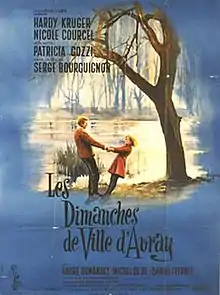Sundays and Cybèle
Sundays and Cybèle is a 1962 French drama film in Franscope, directed by Serge Bourguignon. Its original French title is Les dimanches de Ville d'Avray (Sundays in Ville d'Avray), referring to the Ville-d'Avray suburb of Paris. The film tells the tragic story of a young girl who is befriended by an innocent but emotionally disabled veteran of the French Indochina War. The film is based on a novel by Bernard Eschasseriaux, who collaborated on the screenplay.
| Sundays and Cybèle | |
|---|---|
 Original French poster 1962 | |
| Directed by | Serge Bourguignon |
| Screenplay by | Serge Bourguignon Antoine Tudal Bernard Eschassériaux |
| Based on | Les dimanches de Ville d'Avray by Bernard Eschassériaux |
| Produced by | Romain Pinès |
| Starring | Hardy Krüger Nicole Courcel Patricia Gozzi |
| Music by | Maurice Jarre |
| Distributed by | Davis-Royal Columbia Pictures |
Release date |
|
Running time | 111 minutes |
| Country | France |
| Language | French |
Plot
Pierre suffers from amnesia after a war-time accident in which he might have killed a young Vietnamese girl while crash-landing his stricken plane. His nurse, Madeleine, lives with him in a low-key but potentially romantic relationship. When Pierre sees Cybèle, a young girl in distress as her obviously loveless father is dropping her off at an orphanage, he befriends her. Each of the two is lonely, childlike, and in need of a supportive friend. Eventually, he pretends to be the girl's father, which allows her to escape the locked orphanage for a day, and he shares every one of his Sundays with her for months.
Pierre conceals his friendship with Cybèle from Madeleine, but she eventually finds out, and tells Bernard, a doctor who has a romantic interest in her. Bernard assumes the girl to be in danger, and notifies the police, who adopt the same assumption.
Pierre has nothing to give Cybèle for Christmas, so he accepts her facetious challenge to bring her the metal rooster from the top of a Gothic church near the orphanage. While Cybèle falls asleep, awaiting Pierre for their Christmas together in the snow-covered park's gazebo, the former pilot musters the nerve to climb the 300-foot steeple. With his knife as a tool to unscrew the rooster, he brings it down. As he returns to Cybèle, with the metal rooster and his knife in his hands, the police arrive and shoot him dead to "protect" the child, whom they imagine to be in danger. Cybèle awakens to the horror of seeing that her friend is dead and cries in anguish.
Cast
- Hardy Krüger as Pierre
- Nicole Courcel as Madeleine
- Patricia Gozzi as Cybèle/Françoise
- Daniel Ivernel as Carlos
- André Oumansky as Bernard
Reception
Critical response
Sundays and Cybele has an approval rating of 55% on review aggregator website Rotten Tomatoes, based on 11 reviews, and an average rating of 6.3/10.[1]
Awards and nominations
Sundays and Cybele won the 1962 Academy Award for Best Foreign Language Film.[2] The nominations for writing and scoring were for the 1963 Academy Awards the following year.
| Award | Category | Recipient and nominees | Result |
|---|---|---|---|
| Academy Awards | Best Foreign Language Film | Won | |
| Best Writing, Screenplay Based on Material from Another Medium | Serge Bourguignon Antoine Tudal |
Nominated | |
| Best Scoring of Music—Adaptation or Treatment | Maurice Jarre | Nominated | |
| Blue Ribbon Awards | Best Foreign Language Film | Serge Bourguignon | Won |
| Golden Globes | Samuel Goldwyn International Award[3] | Nominated | |
| National Board of Review | Best Foreign Language Film | NBR Award | Won |
See also
References
- "Sundays and Cybele - Rotten Tomatoes". Rotten Tomatoes.
- "The 35th Academy Awards (1963) Nominees and Winners". oscars.org. Retrieved 2011-11-01.
- Official Website of the Annual Golden Globe Awards
External links
- Sundays and Cybèle at IMDb
- Sundays and Cybèle at Rotten Tomatoes
- Sundays and Cybèle: Innocent Love? an essay by Ginette Vincendeau at the Criterion Collection